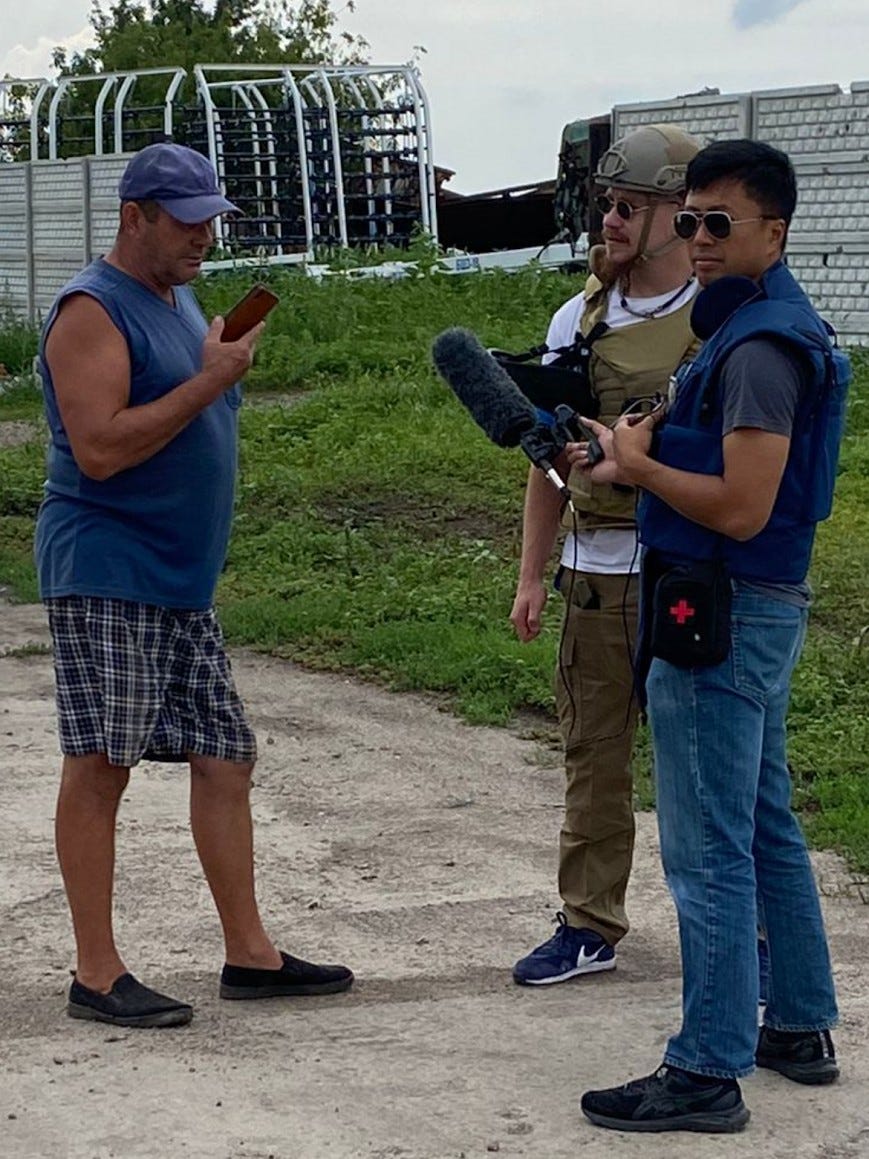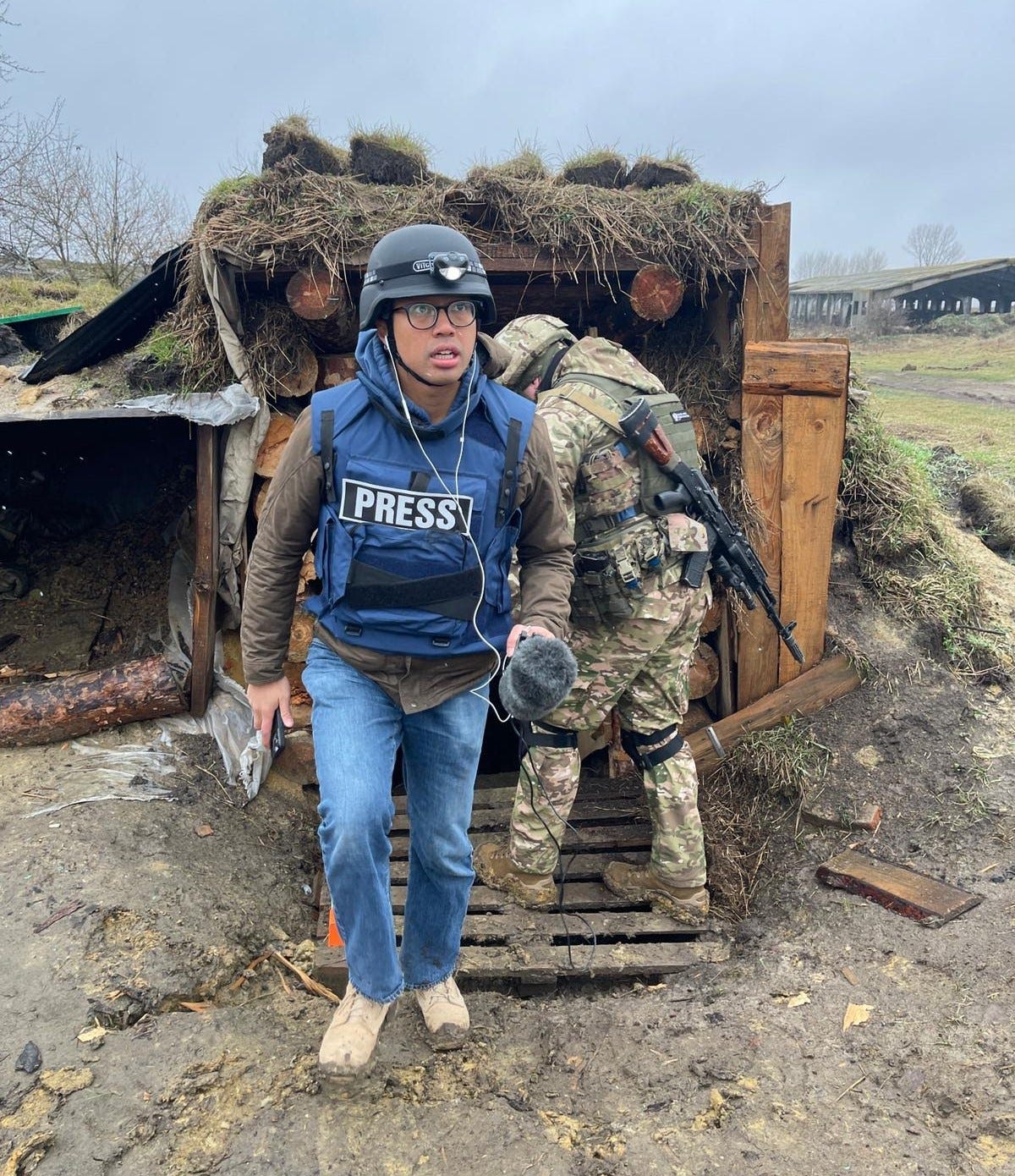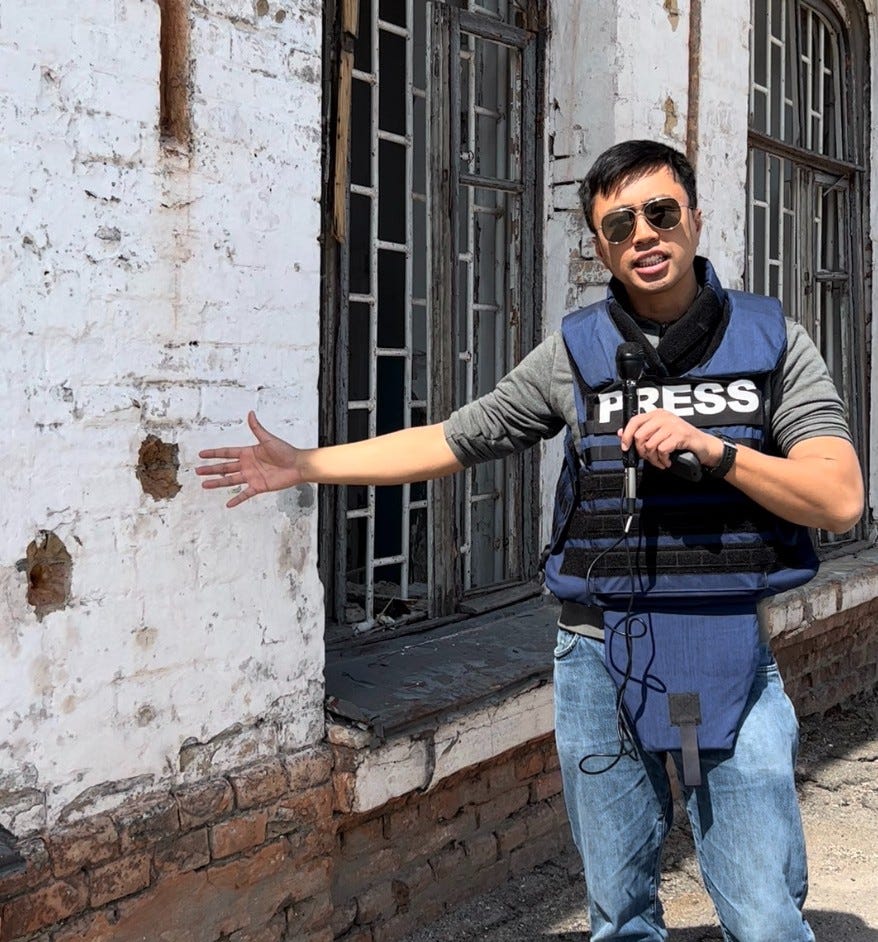Tim Mak on reporting from Ukraine 15 months into Putin's war
“It would drive you crazy to constantly obsess about whether or not a missile might come through the window.”

This work is entirely funded by paid subscribers. To support what we do, please consider becoming one.
Around 3 a.m. on Tuesday, Tim Mak woke to the sound of loud, sustained explosions. He recorded the blasts (along with some profanities they elicited from him) and posted the audio hours later on his must-read new Substack, The Counteroffensive.
Scenes of this sort would be hard to process for most of us, but they’re a fact of life for Mak. That’s because he’s currently reporting in Kyiv, where, on a near-nightly basis, Ukrainian air defenses are intercepting Russian missiles over neighborhoods as people try to sleep.
The Counteroffensive is about the war, but Mak is covering more than “just the bangs and the booms,” as he puts it. He’s telling the stories of people like Georgy, a 58-year-old artist who sat on a Kyiv Zoo bench Tuesday morning hours after it was nearly hit by a piece of shrapnel that fell from the sky.
"Art is the thing people need least in these circumstances," Georgy told Mak through Mak’s translator. "If I do one good portrait, the day is not for nothing."
Mak, a 35-year-old former US Army medic and longtime reporter, decided to take the bold step of becoming an independent journalist in a country at war when he was laid off last month by NPR.
“The push was that I needed work, and wanted to build something of my own by starting The Counteroffensive,” he told me. “The pull is that once you start telling stories of these humans in a conflict zone — their anguish, their resilience, their anger — it's hard not to feel drawn to them.”
Mak is already detailing all sorts of fascinating slices of Ukrainian life is his newsletter. We connected via Zoom Wednesday evening Kyiv time while he was hanging out in his apartment. Given the Russian strikes, I asked him how worried he is when he goes to bed that he might not wake up.
“I'm not sure people who live in Kyiv think about it that way,” he said. “It would drive you crazy to constantly obsess about whether or not a missile might come through the window.”
A transcript of the rest of our conversation, lightly edited for length and clarity, follows.
Aaron Rupar
I know you’ve traveled around Ukraine a bit already just this month. In what ways is day-to-day life affected by the war, and how does that vary between regions? Obviously if you go further east, you're basically on the front lines, but how “normal” are things in Kyiv?
Tim Mak
Right now, I'm looking out my window, and across the street from my apartment is a soldier in a uniform having a drink with a couple guys at a blues bar that sells Mexican food. The professional class is doing okay. But there's a toll that this war is taking that’s hidden below the surface. Almost everyone in this country knows someone who's been killed or wounded. There’s also this underlying constant stress that comes with being in a war zone, and it just doesn't go away. And I’m not even Ukrainian. I get to leave when I want. I can't imagine what it does to folks who are Ukrainian, who feel this personally because it's their country and they have to endure the violence and attacks on a daily basis.
So, superficially it looks really quite normal on a sunny spring day. You'll see people out, walking in parks, dogs frolicking in the streets, people having a cup of coffee on a terrace. And it's actually a very beautiful city, but beneath that all is some troubling signs about mental health and suffering and violence that's happening all across the country.
Public Notice is entirely funded by readers and made possible by paid subscribers. To support this work, please click the button below and sign up to get our coverage of politics and media directly in your inbox three times a week.
Aaron Rupar
Are there any aspects of living and working in a country that’s under attack that would be especially unnerving for people such as myself who have never had that experience?
Tim Mak
Every war is different. This is a very large country, and so it can feel sometimes like you're not in a country that’s at war at all if you squint and maybe plug your ears a little bit. It’s a country where you can be reporting on the front lines in the morning and having sushi and a nice cocktail by evening. That can be very jarring, and it can also lead to what I think a lot of soldiers and military service members are worrying about, which is this idea that as the war drags on longer and longer, civilians are trying to normalize it. It’s pretty normal for folks to adapt to even very violent situations. That's one of the things I think would be hard to explain in a typical story.

Aaron Rupar
When did you first travel to Kyiv?
Tim Mak
I arrived in Kyiv the night the invasion began — February 23, 2022. So I was in Kyiv before the war began, but really only a matter of five or six hours.
Aaron Rupar
Wow. I would assume even relative to just 15 months ago that the city has become somewhat hollowed out.
Tim Mak
Kyiv in some ways is actually more crowded than it was before the war began because a lot of people from the east, from the areas most affected by the violence, have become internally displaced people and moved here. And then in Lviv, which is further west, there's even more evidence of overcrowding and things like long lines waiting for buses and traffic jams. So these cities are very crowded, and it gives the misleading impression that things are normal.
Demographically, one of the big issues that Ukraine has now and will have for many years into the future is this brain drain. Some of the brightest young Ukrainians who speak English have left the country and found other places to host them. And the longer this this war goes on, the less likely they will be to come back.
Aaron Rupar
The name of your Substack is The Counteroffensive, which is quite timely, since there’s an expectation here in the US that Ukraine will launch a counteroffensive soon. What’s the vibe in Ukraine?
Tim Mak
Ukrainians, generally speaking, are very much united about the need to win the war. Now, victory has different definitions depending on who you ask, but in general, there's no big push for negotiations. But I think some Ukrainians are starting to understand that they put a little bit too much stock into the counteroffensive. And they've raised expectations to the point where they could really never be satisfied.
The counteroffensive, if it does end up happening, is not being done as a matter of military necessity. It's a political necessity. It's Europe and the West and the United States and other allies of Ukraine saying, “Look, we've invested heavily in weaponry and aid and money. You need to show us something for that. And you need to make gains.”
Aaron Rupar
The audio you posted of explosions over Kyiv the other night was really jarring. What level of concern do people have about their apartments getting hit by a missile?
Tim Mak
I'm not sure people who live in Kyiv think about it that way. It would drive you crazy to constantly obsess about whether or not a missile might come through the window. As adaptable beings, we tend to push it aside, but it goes somewhere, and that stress accumulates. What I'm seeing from a lot of my friends and people I meet now 15 months into the war is the accumulation of that stress. How could it not have an effect on mental health?
SUBSCRIBE TO TIM MAK’S NEW PUBLICATION, THE COUNTEROFFENSIVE
Aaron Rupar
Are you planning to do any reporting from the front lines? If so, are you basically on your own to get there, or are there Ukrainian authorities who help journalists and do what they can to keep them safe?
Tim Mak
The rules have changed a lot over time. You have to have a press credential. And right now Ukraine is split up into local zones. Green zones you can go to without a government escort. Yellow zones, you're required to have a government escort in order to report there. And in red zones you're not permitted to report. Local commanders make the decisions as to what color each of those zones are.
But I run my own publication now — The Counteroffensive — and our big focus is telling human interest stories and features and investigations that take us away from just the bangs and the booms. So while we might be going into zones where there's active fighting and conflict, that’s not our primary purpose.
My big concern has been that there's been a sort of Ukraine fatigue in a lot of places. And my hope is to be able to write interesting and compelling stories that feature something you can empathize with, whether it's your love for dogs, interest in jazz music, or a hobby of standup comedy. I want to be able to tell stories that are compelling, and they happen to take place in Ukraine.
Aaron Rupar
Like you said earlier, you were in Kyiv literally on day one of this war. Fifteen months later, are you at all surprised with how it’s played out?
Tim Mak
There are different answers depending on which version of me you ask. If you’re asking February 2022 me, yes, I'm incredibly surprised because when the war broke out, everyone thought that Kyiv could fall within 72 hours. The Ukrainians have surprised everyone again and again. Whether it's the defense of Kyiv or the retaking of the Kharkiv region, the Ukrainians have bested expectations a number of times. I don't know if they have it in them to do this again with the anticipated counteroffensive. But I think they have a chance at it.
The last 15 months or so have really laid bare that Russia just does not have what you would consider a modern military. It cannot, well over a year into the war, establish air superiority over its much smaller and much less-funded enemy. It has engaged in a number of military operations that have led to thousands of Russian soldiers dying. It failed to capture Kyiv. It was pushed out of Kharkiv. It's now fighting in a much smaller proportion of Ukraine than it originally intended to. Those facts are obvious and it'd be very difficult to say that this war has gone well for Russia. I think the million dollar question is the issue of morale. Intelligence agencies typically do a very good job measuring the number of tanks and troops and vehicles and guns, but morale is harder.
As we see in the case of Kyiv, and as we saw in the case of assessing the US-backed Afghan government in the fight against the Taliban, we can't really quantify morale. It's very hard to know whether the Russian soldiers on the other end of the line really believe in what they're fighting for, and to the extent that they would stand and hold the line when a major counteroffensive happens. And Ukrainians are fighting on home territory. They have that advantage and they're making great use of it.
Aaron Rupar
You brought up Ukrainians retaking the Kharkiv region. I would imagine that area still feels much more at risk, given how close it is to the border with Russia.
Tim Mak
That closeness means there's less time for air defense to work. You can imagine that when a missile is launched, the further it goes, the more opportunities there are to intercept it. When you're close to the Russian border, you're much closer to where the missiles and drones are being launched from, and have much less time to detect and intercept them. So Kharkiv has much more of a frontline mentality than a Kyiv does or a Lviv does.
Aaron Rupar
I’ll let you get back to your evening, but it’s great to talk to you. I’m happy to help get the word out about your newsletter, because people should definitely be checking out your work.
Tim Mak
I appreciate that. We're trying to build something and it's really a big unknown. As you can imagine, it costs a lot to report from here. It’s incredibly expensive to have health insurance and travel insurance from Ukraine. Gas is extremely expensive in a war zone. I already have staff — my interpreter and reporting partner, Ross.
So just to break even is a difficult feat, and we're trying every day to make it work. I hope folks will check us out and give us a shot.
That’s it for this week
I’ll be back with more Monday. Have a great weekend, and please consider becoming a paid subscriber if you aren’t one already.




Thank you for this introduction and interview! Tim Mak has a very useful and wonderful area of how to report on this devastating war. Reading the personal stories mean a lot. It's hard to believe that Russians have any morale themselves, nor morals, to be supporting this senseless losing war as they sit comfortably unshaken by bombs raining down on them. They have sacrificed their young and have to reckon that. I hope that the pressure on Ukrainians to accomplish miracles in this coming counteroffensive will not be too great and cause a loss of heart and will on the part of the allies and support. I look for the light at the end of this. Thank you Aaron and Tim...
Thank you Tim for your reports on the people of Ukraine 🇺🇦. I
subscribed to your Substack and
look forward to seeing more from
inside Ukraine.
And thank you Aaron for bringing this young man to our attention.